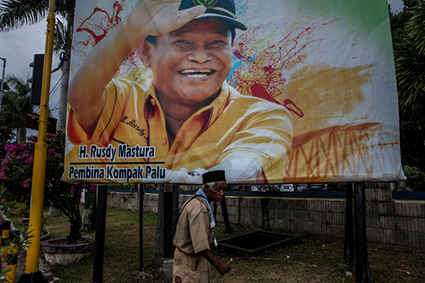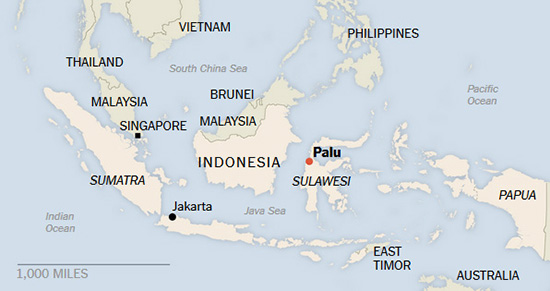
Jeremy Kutner
PALU, Indonesia (The New York Times/Pacific Media Watch): A half-century after the massacre of hundreds of thousands of suspected Communists and sympathisers, Indonesia has shown little interest in reckoning with the event.
An investigation by the National Human Rights Commission, calling for the prosecution of military leaders, was rejected, and efforts to establish a truth and reconciliation commission have failed.
School history texts ignore or whitewash the killings. A 2012 documentary about them won an Oscar nomination, but was not shown in theatres in Indonesia for fear it would be rejected by government censors.
There is one notable exception: the city of Palu, a picturesque provincial capital of some 300,000 people that hugs a horseshoe-shaped bay on the island of Sulawesi.
Three years ago, the mayor here did something that surprised everyone, including himself: He apologised for the killings, becoming one of the only Indonesian officials to do so and, historians say, the first to do it officially, on behalf of his government.
“As a human, as a mayor who has responsibility, I have to apologise,” Mayor Rusdy Mastura said in a video he recorded later. “Why is it difficult to apologise? Why is it difficult to sacrifice to admit that there were maybe mistakes among actions that we took? Now we are to forgive each other.”
Since then, this feisty establishment politician has become an unlikely human rights advocate, and his relaxed seaside city has become the unexpected wellspring of efforts to grapple with one of the bloodiest episodes of the Cold War.
It almost did not happen.

Ex-prisoner gathering
Mastura had been invited to a gathering of former prisoners of Indonesia’s dictatorship and family members of victims of the massacres.
The mayor was hardly a likely supporter. A blunt-talking politician, he was the son of committed anti-Communists. He belonged to the pro-establishment Golkar Party and was a former member of Pancasila Youth, a nationalist paramilitary organisation, both of which have long regarded the killings as justified.
And the subject remains touchy here. Many gatherings like the one Mastura was invited to have been broken up by threats of violence, including several this year in other parts of the country. But he showed up, and he told the small crowd a remarkable story.
Fifty years ago, when he was still in high school, he had been put to work in the anti-Communist sweep. He was assigned to guard prisoners and prevent their escape.
He now says he knows that at least four of the Palu prisoners were later killed. In the years since, he watched as many of the others and their families endured forced labor and unrelenting discrimination.
One of the event’s organisers, Nurlaela A. K. Lamasituju, sensed an opening. “Is there anything you want to say to the victims’ families?” she asked. Mastura fumbled a bit, and then apologised.
That had not been the plan. Some people who attended the event said he became emotional and got carried away. Others say it had been the result of a long-term campaign by Lamasituju and other rights advocates. Mastura himself said he had just come to a realisation.
No future
The victims and their relatives, he explained in a recent interview, “they did not know anything. But they have to live in conditions that make them have no future, especially their kids, because of political differences. This moved me. That’s when I apologised.”
Once he did, local activists seized on it, and Mastura soon took up his newfound position with gusto.
“No other local leader has done anything like this,” said Galuh Wandita, the director of Indonesia and regional programmes at Asia Justice and Rights, a human rights group based in Jakarta, the Indonesian capital. “It is a push against the tide of impunity.”
Two years ago, when a provincial government ministry recognised Palu for promoting human rights, Palu issued its own declaration, designating itself as a “City of Human Rights Consciousness” with a broad mandate to help victims. Posters have popped up around the city in recent months trumpeting the declaration.
Last year, Mastura signed a local regulation officially recognising human rights abuse victims in the city. The regulation, the first of its kind in Indonesia, set up a system to verify victims and their living relatives and prioritise them for city services like money for rehabilitating dilapidated housing and educational scholarships for children.
So far, the programme has identified 485 local victims of the 1965-66 anti-Communist actions.
Now some officials and advocates, including the National Commission on Human Rights, are looking to Palu as a nationwide model.
“We try to push the idea that the mayor can be an example for all the other mayors in Indonesia,” said Nur Kholis, the commission’s chairman.
Reconciliation model
The commission is partnering with the city in hopes of turning the commemoration of the second anniversary of Palu’s declaration this month into an advertisement for Palu-style reconciliation.
Palu was not the worst site of the killings, but did not escape them. After the country’s military leaders blamed the Indonesian Communist Party for an abortive coup in 1965, Communists, sympathisers, leftists and suspected leftists were expelled from government, military and social organisations, and the nationwide bloodletting began.
Over five months, at least 500,000 people were killed by security forces, local militias and vigilante groups.
Only a few executions in Palu have been confirmed, but hundreds here were tortured and imprisoned, with many dying from abuse, or subjected to forced labor, building much of the infrastructure that still serves the city today. Sulawesi was a site of great violence, however, and hundreds, if not thousands, died here, Kholis said.
Silence regarding the killings prevailed in the following decades, and those suspected Communist sympathizers who were not killed or imprisoned faced official discrimination that often extended to later generations. Communist parties remain banned.
For Lamasituju, even the incremental act of official recognition of victims under Palu’s regulation is a major victory. “The struggle is the fight to rehabilitate their names so they can be ordinary people just like everyone else in Palu,” she said. “They have been recognized by the government as humans.”
But the effort has run into political headwinds. Early drafts of the city regulation were watered down, and mentions of 1965 were deleted, making the programme open, in theory, to any victims of human rights abuses. There is little guarantee that money for further investigation will survive when the mayor steps down later this year. Many of those promised city assistance have said that it has been slow to arrive.
Incremental steps
And it is not clear whether Palu’s incremental steps toward reconciliation can be replicated elsewhere. The city’s relatively minor role in the killings may make reconciliation here go down easier than in places that saw more bloodshed.
The remaining victims of the purge here are now mostly old, frail and poor, having been restricted from holding government jobs and subjected to discrimination. In the low-slung buildings of this slow-paced town, many of them live side by side with those who once openly denounced them as Communists.
For Estepien Manarisip, who was arrested during the purge along with her husband, the changes in Palu have been gratifying but slow. During the wave of anti-Communist violence, she lost her position as a teacher, and her husband, a member of the Communist Party, was jailed for more than 10 years. To support her children, she said, she was reduced to selling cakes door to door.
Looking around her dingy, dank home off a narrow alley, she remembered the days when she seemed destined for a comfortable middle-class life. “I couldn’t have imagined that I would be living like this,” she said.
She hopes for money to renovate her house, and while she is thankful for the apology, she said, no funds have yet arrived.
Now in her late 70s, she will wait a little longer. “I can’t do anything more,” she said, “than kneel and pray.”
This article was first published in print in The New York Times on July 13, 2015.
This work is licensed under a Creative Commons Attribution-NonCommercial 3.0 New Zealand Licence.




